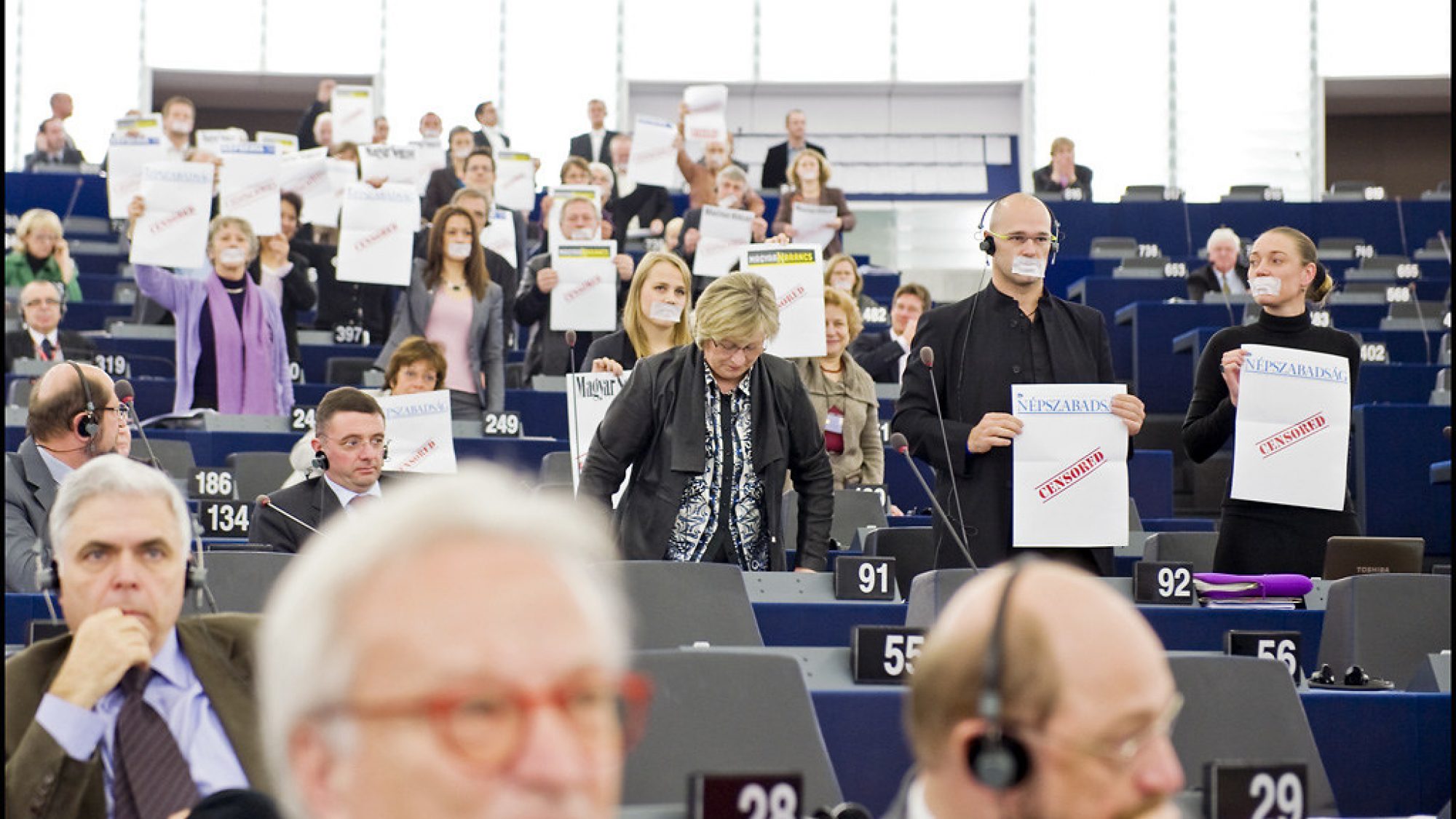
Title: Hungary’s Transformation and the Complicity of the EU
Hungary, once the pioneer of liberal democratic transition, became the first authoritarian Member State of the European Union. How could this happen within the European community, built on the values of democracy and the rule of law, and hasn’t the EU been complicit?
Hungary has received international attention in the last decade for being the first Member State of the European Union (EU) and the forerunner of democratic transition in East-Central Europe to turn into an authoritarian regime. Both Freedom House and the Varieties of Democracy Project have tracked Hungary as it has passed from a ‘consolidated’ liberal democracy in 2010 into the status of a ‘hybrid regime’ (Nations in Transit 2020) or an ‘electoral autocracy’ (Democracy Report 2020). The 2020 Rule of Law Index of the World Justice Project ranked Hungary last out of twenty-four selected countries of the European Union, the European Free Trade Association (EFTA), and North America. The country is no longer a constitutional democracy able to ensure a peaceful rotation of power. Why was the EU, whose foundation is the values of democracy and the rule of law, unable to intercept the process for one of its own members? Hungary’s transition into an authoritarian state was first and foremost facilitated by willing autocrats and fragile domestic democratic institutions, including the disproportional election system and easy amendment rule of the constitution. But the EU has also failed to force its member state to comply with its original admission criteria. This calls for a strong democratic opposition in the country, but also for self-reflection from the EU that, despite being built on the values of democracy and the rule of law, was unable to intercept the rise of authoritarianism in Hungary.
The Constitutional Counter-revolution of 2010
The current Hungarian state of affairs was made possible by the governing Fidesz party’s 2010 electoral victory, called by Prime Minister and party leader Viktor Orbán as a ‘revolution of the ballot boxes.’ Due to the disproportional electoral system, Fidesz, with a slight majority of the votes, received two-thirds of the seats. This allowed them to enact a new constitution without the votes of the weak opposition parties. Hungary, not even a Republic in its name anymore, according to the new Fundamental Law and proudly announced by PM Orbán, became an ‘illiberal state,’ which abolished all checks on the government’s power, like the independence of the Constitutional Court or ordinary judiciary, and does not guarantee fundamental rights, such as freedom of the media or religious freedom.
Hungary’s constitutional transformations obviously matter to Hungary. But the country’s backsliding to an authoritarian state, the re-emergence of right-wing ‘national identity,’ the development of illiberalism as an alternative ideology, the populist appeal to voters, and the inability of transnational institutions to halt domestic democratic decline also pose challenges to the European Union and beyond. Orbán’s regime is often described as ‘populist’ or ‘illiberal.’ But reference to the ‘pure people’ distinguishing them from the ‘corrupt elite’ is a rhetoric by a nationalist elite, which is much more corrupt than its predecessor has ever been, and ‘illiberalism’ covers anti-democrats, whose ideas are authoritarian to their core. Therefore, instead of using the unhelpful concepts of populism or illiberalism to characterize the current Hungarian regime, it is better to call it by its name: autocracy. In this authoritarian system, the institutions of a constitutional state (such as the Constitutional Court, ombudsman, and judicial or media councils) still exist, but their power is very limited. Furthermore, while, as in many autocratic regimes, fundamental rights are listed in the constitution, the institutional guarantees of these rights are endangered through the lack of an independent judiciary and Constitutional Court.
In other words, although Hungary became a liberal democracy on an institutional level after 1989, the consolidation of the system on a behavioral level was always very fragile. If one considers liberalism as not merely a limit on the public power of the majority, but also as a concept that encompasses the constitutive precondition of democracy—the rule of law, checks and balances, and guaranteed fundamental rights—then Hungary is not a liberal democracy anymore. Ever since the victory of the current governing party, almost all public power is in the hands of the representatives of one party.
The EU’s Complicity by Inaction
When Hungary joined the European Union in 2004, both Hungarians and Europeans believed that membership in the EU meant that the country would never be a one-party autocracy again. Given the EU’s commitment to democracy, the rule of law, and fundamental rights, and its process to ensure that all member states will comply with these fundamental values, such a backward slide was unthinkable. If it occurred, the EU was expected to be nimble enough to intercept. But the EU was not prepared for non-compliance.
After many years of hesitation, in September 2018, the European Parliament—for the first time ever—launched Article 7 TEU proceedings against the Hungarian government. According to the Lisbon Treaty, this mechanism, called a ‘nuclear option’ by former EU Commission President Barroso, is triggered when there is “a clear risk” of an EU member state breaching the bloc’s fundamental values, which include “human dignity, freedom, democracy, equality, the rule of law and respect for human rights, including the rights of persons belonging to minorities.” But this Parliamentary resolution came several years after the Orbán government’s actions already represented a ‘clear risk of a serious breach’ of the EU’s values.
Launching Article 7 also meant too little. Besides the important political function of naming and shaming Hungary as a violator of EU values, its actual effects are mitigated because the chance to reach the corrective arm of the procedure―namely serious sanctions―is extremely low, as this procedure has been stuck in the Council ever since. Also, other mechanisms, such as the EU Rule of Law Toolbox published on 3 April 2019, the Rule of Law Review Cycle announced on July 17, 2019, or the Annual Rule of Law Reports produced in 2020, proved to be ineffective in Hungary’s case. Hence, one could argue that instead of such ineffective tools, the EU should have approached Hungary by initially cutting off EU structural funds for regional development or other forms of assistance.
This change was implemented in May 2018 when the European Commission proposed a new Conditionality Regulation for the Parliament and the Council with the purpose to condition the distribution of EU money on compliance with the rule of law, so that EU money no longer funded national authoritarian governments such as Hungary’s. But the law-making process changed the regulation to become much harder to trigger and more limited in what it can reach. In fact, the term ‘rule of law’ is not even included in the regulation’s current title. This first ‘compromise’ in September 2020 was a consequence of Germany’s effort to protect Fidesz member of the European People’s Party’s (EPP) fraction in the European Parliament, partly because of the strong economic interests of Germany in Hungary, such as the German car industry. The Hungarian and the Polish governments wanted to get rid of the conditionality regulation altogether and threatened to veto the EU’s Multiannual Financial Framework—the next seven-year budget of the Union—and the Recovery plan package, which aimed at healing the damages caused by the COVID-19 pandemic. The threat of veto changed the political mood in the EU; the determined position of the Netherlands, the Nordic countries, and the European Parliament pushed the German presidency to soften its initial conciliatory attitude towards Hungary (and Poland). Thanks to this push, the budgetary conditionality was adopted. Even though it does not explicitly protect the rule of law, it does protect the Union budget in cases when funds have already been misspent.
Although the subject of blackmail through veto has disappeared with the adoption of the Conditionality Regulation, the European Council made another compromise on December 10, 2020 by adopting the EUCO Conclusion, again brokered by the German Presidency with the Hungarian and the Polish government. Even though the Conclusion is non-binding, it certainly has effects, practically suspending the application of the Regulation by allowing Member States to challenge it before the Court of Justice of the European Union. On March 10, as expected, the Hungarian government (along with its Polish counterpart) challenged the Regulation. This provided the opportunity for the Hungarian ‘mafia state’ to keep misusing EU funds for the benefit of Orbán’s oligarchs and his own family and avoid triggering the Regulation before the 2022 parliamentary elections.
Conclusion
With the backsliding of democracy in Hungary, the European Union faces the creation of its first authoritarian Member State. However, the last decade has shown that the EU has been unable to prevent or counter this situation. Not because it has no effective legal tools, but because it lacks the political will to use them against a rogue government. Even the newly-introduced economic conditionality mechanism is burdened with a number of bad compromises. Fidesz’s recent leave from EPP’s European parliamentary fraction provides a slight hope for the discontinuation of the unprincipled protection of Hungary’s autocratic government and the start of serious enforcement of the values of democracy, the rule of law, and fundamental rights that make up the EU’s ideological foundation. Otherwise, the EU is doomed to fail as a value community, and may fall apart altogether as a result.
. . .
Gábor Halmai is the Professor and Chair of Comparative Constitutional Law at the Law Department of the European University Institute in Florence. His primary research interests are comparative and European constitutional law. His recent research focuses on illiberal constitutional theories and developments in East-Central Europe. Email: gabor.halmai@eui.eu.
Image Credit: European Parliament
Recommended Articles

As the Trump administration proposes a sweeping overhaul of the US foreign assistance architecture by dismantling USAID, the Millennium Challenge Corporation (MCC), and restructuring the State Department, there is an…

The Trump administration’s abandonment of allies and embrace of Putin’s Russia has raised pressing questions about whether Estonia, Latvia, and Lithuania can continue to rely on NATO for…

Amid ongoing internal conflicts in Sudan, Ethiopia, Somalia, and South Sudan, unconventional transactions involving statehood, dams, ports, and security alliances seem to be reshaping the fragile region. This article analyzes…